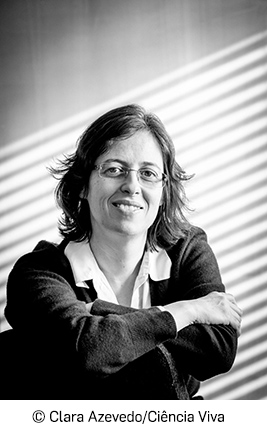Mariana Gomes de Pinho is new ERC Awardee
Oeiras, 28 November 2017
Mariana Gomes de Pinho, researcher at ITQB NOVA since 2006, is one of the most recent recipients of the European Research Council Consolidator Grants. The list of 329 awardees in 2017 was released today by the ERC and includes eight researchers working in Portugal. With 2.6 M€ for the next five years, Mariana Pinho´s research project will focus on understanding the cell cycle of antibiotic resistant bacteria and developing new tools to search for novel antibiotics and understand their mechanism at the single cell level.
Over the past years, Mariana Pinho’s Lab has become expert on the biology of Staphylococcus aureus. They have constructed powerful biological tools to study cell division and synthesis of the cell surface and have studied mechanisms of action of various antimicrobial compounds, with financing from the ERC starting grant won in 2012. Now, Mariana Pinho is aiming to be able to quickly unravel the function of new players in the bacterial cell cycle and simultaneously contribute to accelerate antibiotic discovery. The group will continue to use the Gram positive bacteria S. aureus as a model organism, a very important clinical pathogen. This is one of the most common multidrug resistant bacteria in the European Union and a major concern to public health.
Mariana Pinho is one of 7 researchers in Lisbon to receive a Consolidator ERC Grant [Susana Lima, Joseph Paton and Michael Orger, Champalimaud Research Programme, Ana Domingos and Luís Teixeira, Instituto Gulbenkian de Ciência IGC and Luísa Figueiredo, Instituto de Medicina Molecular iMM João Lobo Antunes, see press release] and her project is one of the highlighted awardees by ERC for this year.
The European Research Council (ERC), established in 2007, is the first pan-European funding body supporting the best frontier research in Europe. The ERC aims to stimulate scientific excellence in Europe by supporting the very best scientists from anywhere in the world, in any field of research. There are neither thematic priorities, nor geographical quotas. To date, the ERC has funded over 7,500 top researchers at various stages of their careers, and more than 50,000 postdocs, PhD students and other staff working in their research teams. The ERC has an annual budget of €1.8 billion for the year 2017, which is around 1% of overall spending on research in Europe. In this Consolidator Grant competition 2538 applications were received, out of which 13% will be funded. Thirty-two percent of grants were awarded to female applicants. [see statistics].
About the awardee
Mariana Gomes de Pinho studied Applied Chemistry at the Faculdade de Ciências e Tecnologia, Universidade Nova de Lisboa. She started her research career studying mechanisms of antibiotic resistance, in the Laboratory of Prof Hermínia de Lencastre, at the Instituto de Tecnologia Química e Biológica (ITQB NOVA), Oeiras.
She continued these studies with Prof. Hermínia de Lencastre during her PhD, for which she moved, in 1997, to the Laboratory of Prof Alexander Tomasz at The Rockefeller University, in New York. In 2001 she became interested in understanding where and how proteins localize in the bacterial cell and joined the Laboratory of Prof Jeff Errington in the University of Oxford, UK, to work on this subject as a post-doctoral fellow.
After 8 years abroad she decided to return to Portugal and in 2006 started her own research group, the Bacterial Cell Biology Laboratory, at ITQB NOVA. In 2012 Mariana was awarded an ERC starting grant and in 2017 an ERC consolidator grant, both to study cell division and antibiotic resistance of Staphylococcus aureus bacteria. She is the mother of three girls, aged 16, 13 and 9 years old, and is happy to combine her roles as scientist and mother.
Highlight of recent Mariana Pinho's work
-
Mariana Pinho features in "Women in Science/Mulheres na Ciência" exhibition and book by Ciência Viva.
-
How do bacteria get in shape? First generation of elongated cells from truly spherical cocci, 6.09.2016
-
How do bacteria divide? Super-resolution microscopes challenge Staph division model, 17.08.2015
In the news
-
Portugal recebe mais oito bolsas milionárias, Visão, 28.11.2017
-
Mais de 16 milhões de euros de bolsas europeias vêm para oito cientistas em Portugal, Público, 28.11.2017
-
Horizonte 2020 - Oito cientistas portugueses contemplados, Jornal das 12, RTP 3, 28.11.2017
-
Quem são e o que estudam os oito investigadores que receberam mais de 16 milhões de euros, Observador, 28.11.2017
-
Oito projetos portugueses recebem bolsas de mais de 16 milhões, Diário de Notícias, 28.11.2017
-
Oito cientistas portugueses ganham 16 ME em bolsas do Horizonte 2020, TSF, 28.11.2017
-
Oito cientistas a trabalhar em Portugal ganham bolsas de €16 milhões do Conselho Europeu de Investigação, Expresso, 28.11.2017
-
Oito cientistas portugueses ganham 16 milhões de euros em bolsas do Horizonte 2020, Sapo 24, 28.11.2017
-
Oito cientistas portugueses ganham 16 ME em bolsas europeias, Smooth Fm, 28.11.2017
-
Oito cientistas portugueses vencem 16 milhões em bolsas de investigação europeias, Sapo Lifestyle, 28.11.2017
-
Oito cientistas portugueses ganham 16 ME em bolsas europeias, Rádio Comercial, 28.11.2017
-
Oito cientistas portugueses ganham 16 milhões em bolsas do Horizonte 2020, Notícias ao Minuto, 28.11.2017
-
Oito cientistas portugueses ganham 16 ME em bolsas do Horizonte 2020, Jornal de Notícias, 28.11.2017
-
Oito cientistas portugueses ganham 16 ME em bolsas do Horizonte 2020, O Jogo, 28.11.2017
-
Mais 16 milhões premeiam excelência em Portugal, Diário de Notícias, 28.11.2017
-
Oito portugueses recebem 16 milhões de euros em bolsas do Horizonte 2020, JM Madeira, 28.11.2017
-
Cientistas portugueses recebem 16 milhões de euros de bolsas do ERC, Viver Saudável, 28.11.2017
-
Cientistas portugueses recebem 16 milhões de euros de bolsas do ERC, Netfarma, 28.11.2017







